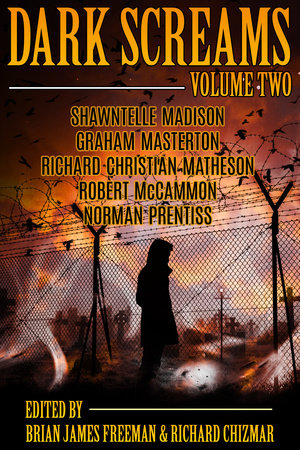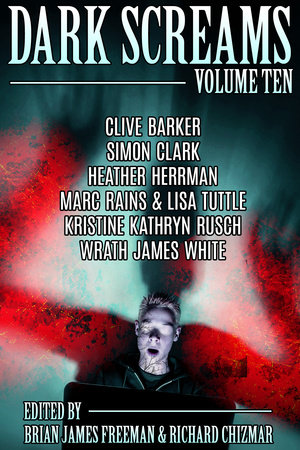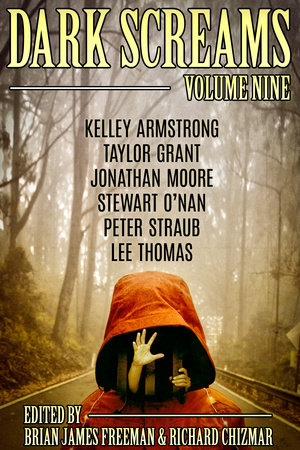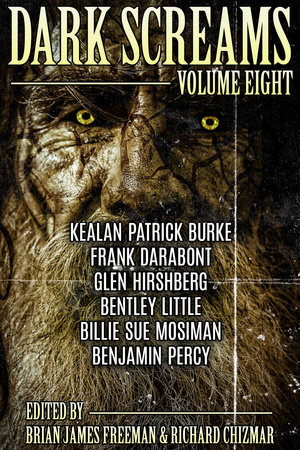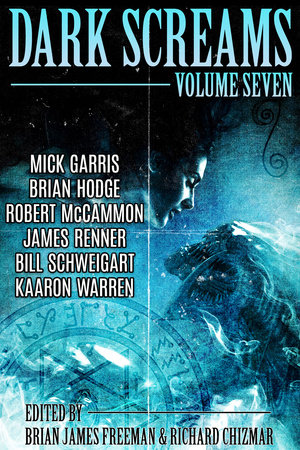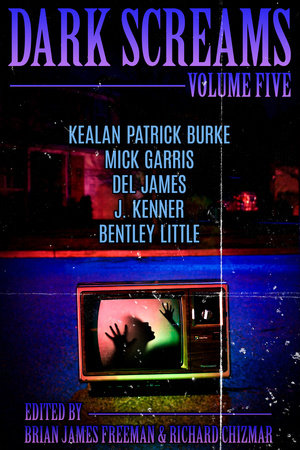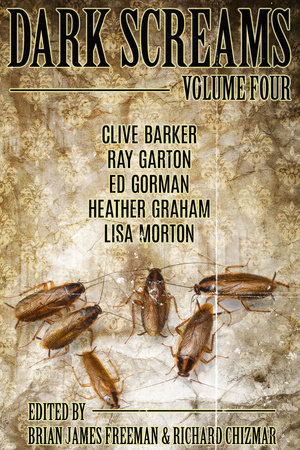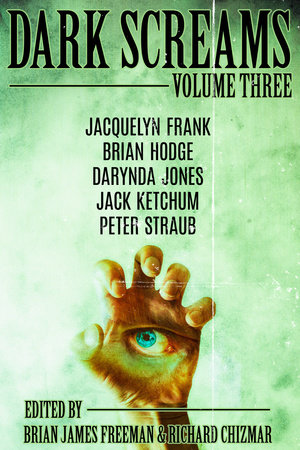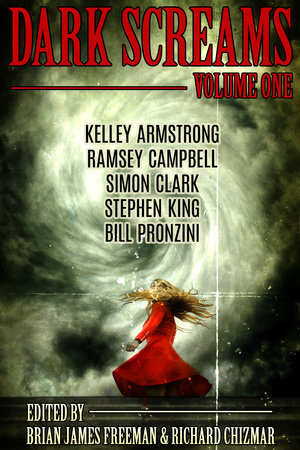Excerpt
Dark Screams: Volume Two
The Deep End
Robert R. McCammon
Summer was dying. The late-afternoon sky wept rain from low, hovering clouds, and Glenn Calder sat in his Chevy station wagon, staring at the swimming pool where his son had drowned two weeks ago.
Neil was just sixteen years old, Glenn thought. His lips were tight and gray, and the last of his summer tan had faded from his gaunt, hollowed face. Just sixteen. His hands tightened around the steering wheel, the knuckles bleaching white. It’s not fair. My son is dead—and you’re still alive. Oh, I know you’re there. I’ve figured it all out.
You think you’re so damned smart. You think you’ve got everybody fooled. But not me. Oh, no—not me.
He reached over the seat beside him and picked up his pack of Winstons, chose a cigarette and clamped the filter between his lips. Then he punched the cigarette lighter in and waited for it to heat up.
His eyes, pale blue behind a pair of horn-rimmed glasses, remained fixed on the Olympic-sized public swimming pool beyond the high chain-link fence. A sign on the admissions gate said in big, cheerful red letters: closed for the season! see you next summer! Beyond the fence were bleachers and sundecks where people had lolled in the hot, sultry summer of north Alabama, and there was a bandstand where an occasional rock band had played at a pool party on a Saturday night. Steam rose from the glistening concrete around the pool and, in the silence between the patter of raindrops, with his windows rolled down and the moody smell of August’s last hours inside the car, he thought he could hear ghostly music from that bandstand, there under the red canopy where he himself had danced as a kid in the late fifties.
He imagined he could hear the shouts, squeals, and rowdy laughter of the generations of kids that had come to this pool, here in wooded Parnell Park, since it had been dug out and filled with water back in the mid-forties. He cocked his head to one side, listening, and he felt sure that one of these ghostly voices belonged to Neil, and Neil was speaking like a ripple of water down a drain, calling “Dad? Dad? It killed me, Dad! I didn’t drown! I was always a good swimmer, Dad! You know that, don’t you . . . ?”
“Yes,” Glenn answered softly, and tears filled his eyes. “I know that.”
The lighter popped out. Glenn got his cigarette going and returned the lighter to the dashboard. He stared at the swimming pool as a tear crept down his cheek. Neil’s voice ebbed and faded, joining the voices of the other ghosts that were forever young in Parnell Park.
If he had a dollar for every time he’d walked through that admissions gate he’d be a mighty rich man today. At least he’d have a lot more money, he mused, than running the Pet Center at Brookhill Mall paid him. But he’d always liked animals, so that was okay, though when he’d been young enough to dream he’d had plans of working for a zoo in a big city like Birmingham, traveling the world and collecting exotic animals. His father had died when he was a sophomore at the University of Alabama, and Glenn had returned to Barrimore Crossing and gone to work because his mother had been hanging on the edge of a nervous breakdown. He’d always planned on going back to college, but the spool of time just kept unwinding: He’d met Linda, and they’d fallen in love. And then they’d gotten married and Neil was born four years later, and . . .
Well, that was just the story of life, wasn’t it?
There were little flecks of rain on his glasses, caused when the drops ricocheted off the edge of the rolled-down window. Glenn took his glasses off to wipe the lenses with a handkerchief. Without the glasses, everything was kind of fuzzy, but he could still see all right.
His hands were trembling. He was afraid, but not terrified. Funny. He’d thought for sure he’d be scared shitless. Of course, it wasn’t time yet. Oh, no. Not yet. He put his glasses back on, drew deeply at his cigarette and let the smoke leak from his mouth. Then he touched the heavy-duty chain cutter that lay on the seat beside him.
Today—the last day of summer—he had brought his own admission ticket to the pool.
Underneath his trousers he was wearing his bathing suit—the red one, the one that Linda said he’d better not wear around the bull up in Howard Mackey’s pasture. Glenn smiled grimly. If he hadn’t had Linda these past two weeks it might’ve made him slip right off the deep end. She said they were strong, that they would go on and learn to live with Neil’s death, and Glenn had agreed—but that was before he’d started thinking. That was before he’d started reading and studying about the Parnell Park swimming pool.
That was before he knew.
After Neil had drowned, the town council had closed the pool and park. Neil had been its third victim of the summer; back in June a girl named Wanda Shackleford had died in the pool, and on the Fourth of July it had been Tom Dunnigan. Neil had known Wanda Shackleford. And Glenn remembered that they’d talked about the incident at home one night.
“Seventeen years old!” Glenn had said, reading from a copy of the Barrimore Crossing Courier. “What a waste!” He was sitting in his Barcalounger in the den, and Linda was on the sofa doing her needlepoint picture for Sue Ann Moore’s birthday. Neil was on the floor in a comfortable sprawl, putting together a plastic model of a spaceship he’d bought at Brookhill Mall that afternoon. “Says here that she and a boy named Paul Buckley decided to climb the fence and go swimming around midnight.” He glanced over at Linda. “Is that Alex Buckley’s boy? The football player?”
“I think so. Do you know, Neil?”
“Yeah. Paul Buckley’s a center for Grissom High.” Neil glued a triangular weapons turret together and put it aside to dry, then turned to face his father. Like Glenn, the boy was thin and lanky and wore glasses. “Wanda Shackleford was his girlfriend. She would’ve been a senior next year. What else does it say?”
“It’s got a few quotes from Paul Buckley and the policeman who pulled the girl’s body out. Paul says they’d had a six-pack and then decided to go swimming. He says he never even knew she was gone until he started calling her and she didn’t answer. He thought she was playing a trick on him.” He offered his son the paper.
“I can’t imagine wanting to swim in dark water,” Linda said. Her pleasant oval face was framed with pale blond hair, and her eyes were hazel, the same color as Neil’s. She concentrated on making a tricky stitch and then looked up. “That’s the first one.”
“The first one? What do you mean?”
Linda shrugged uneasily. “I don’t know. Just . . . well, they say things happen in threes.” She returned to her work.
“I think the city should fill in that swimming pool.”
“Fill in the pool?” There was alarm in Neil’s voice. “Why?”
“Because last June the Happer boy drowned in it, remember? It happened the first weekend school was out.
Thank God we weren’t there to see it. And two summers before that, the McCarrin girl drowned in four feet of water. The lifeguard didn’t even see her go down before somebody stepped on her.” She shivered and looked at Glenn. “Remember?”
Glenn drew on his cigarette, staring through the rain-streaked windshield at the pool. “Yes,” he said softly. “I remember.” But at the time, he’d told Linda that people—especially kids—drowned in pools, ponds, and lakes every summer. People even drown in their own bathtubs! he’d said. The city shouldn’t close Parnell Park pool and deprive the people of Barrimore Crossing, Leeds, Cooks Springs, and the other surrounding communities.
Without Parnell Park, folks would have to drive either to Birmingham or go swimming in the muddy waters of nearby Logan Martin Lake on a hot summer afternoon!
Still, he’d remembered that a man from Leeds had drowned in the deep end the summer before Gil McCarrin’s daughter died. And hadn’t two or three other people drowned there as well?
“You think you’re so damned smart,” Glenn whispered. “But I know. You killed my son, and by God you’re going to pay.”
A sullen breeze played over the pool, and Glenn imagined he could hear the water giggle. Off in the distance he was sure he heard Neil’s voice, floating to him through time and space: “It killed me, Dad! I didn’t drown . . . I didn’t drown . . . I didn’t . . . I—”
Glenn clamped a hand to his forehead and squeezed. Sometimes that made the ghostly voice go away, and this time it worked. He was getting a whopper of a headache, and he opened the glove compartment and took a half-full bottle of Excedrin from it. He popped it open, put a tablet on his tongue, and let it melt.


